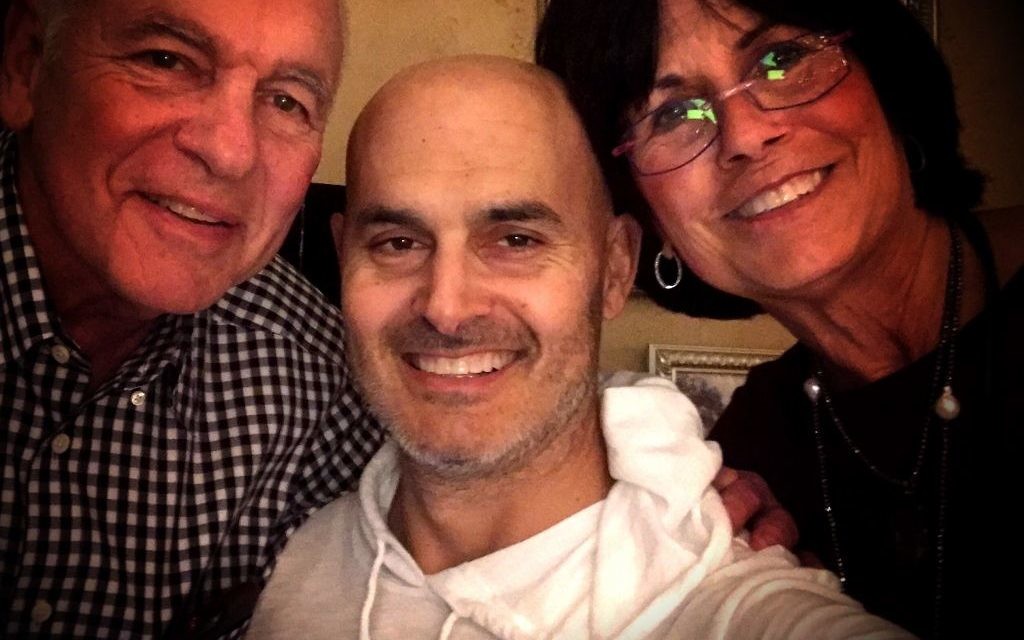Future Haunts Us After Scott Selig’s Death
When the world is out of order, it's up to us to honor his memory by taking needed action.

“Out of order.”
Those were the words Rabbi Peter Berg spoke Sunday, Oct. 29, as he began the memorial service for our friend Scott Selig.
Scott had died two days earlier after a yearlong battle with cancer. Notwithstanding his valiant attitude, embodied by the “ScottStrong” movement he inspired, the truth was inescapable: The battle was over.
Get The AJT Newsletter by email and never miss our top stories Free Sign Up
Rabbi Berg was right. Life indeed felt out of order. A father was burying his son, and a city counting on the long life of a leader had been cheated by his premature death. A family that extends well beyond blood, that includes friends and colleagues, allies and admirers, was gathered in solemn remembrance of a life that had a fullness of spirit but was marked by a cruel reordering of time.
It is a rare person who can make everyone feel like a close friend; Scott had that skill. And while he reserved the best for his family, what he shared as a businessman, as a community activist, as a conspirator of good was immeasurable.
Scott was potent, not only in what he did and what he could achieve. He did it in style, literally and figuratively.
I remember many years ago a conversation Scott and I had about the future. It was one of those conversations you don’t forget — a mix of wistfulness and bravado, of creativity and commitment. A conversation punctuated with phrases like “when it’s our turn” and “just wait until,” sprinkled among concrete ideas and confident assurances.
I remember leaving that conversation thinking to myself that I wasn’t so sure we would be able to do all that we said, but that I had every bit of confidence that Scott could do much of what he intended.
And I recall thinking that sometimes those who can do it just need some of us to believe in them, so that they will do it — that, in time, given the chance, leaders lead. It just comes in due time — in order.
Yet, now for the second time in my life, I have seen that order is not guaranteed; time is not assured. For the second time I have seen a charismatic young friend with unlimited potential taken far too soon, leaving far too much undone — in family and in life.
Sitting in a temple full of people, lauding the one person who everyone wished had been there — it was too familiar. It was an echo of the past and the foreshadowing of a future that is supposed to be distant.
These friends, they are ghosts of unwritten futures. Their loss is personal and profound. And while we celebrate their legacies, the truth is inescapable: Losing a friend like Scott Selig, and Jon Barkan before him, is not just about the personal; it is about the aching of the possible.
Because in a world in which too many people make choices based what they want and what they will get, there are still far too few people who make choices based on how they can help and whom they can heal. And there are far too few people who embrace the diversity of their community over the security of their tribe.
There are far too few people like Scott, and when we lose one, we lose so much more. We lose the multitude of their potential, in big and small ways.
Yes, their memory might be a blessing, but only if that memory lives within the commitment and the kindness of others. Only if it is a memory that is lived in action and in the recognition that with one fewer person to carry the load, we all must do more, must be more.
Because if we are honest with ourselves, today there is so much that is out of order, so much that needs repair. The order of life, as we have been told, is to grow, learn, build, reap and then give back. But times out of order require commitments out of order.
Perhaps we can’t wait for “in due time” — perhaps we need to respond now, give now, create now. The later might not come, or if it does, it might come too late.
Perhaps the people around us are not here to help us make plans, but rather to help us make change. Perhaps the legacy we have is not the phantom of the future, but the reality of the present; a call to action inspired by the memory of a friend. Perhaps … perhaps.
It is autumn again, and winter is around the corner. Leaves are falling; the chill in the air is more persistent.
Soon we will be at the midpoint between the heat of summer and the warmth of spring, and we will count on the order of the days to take us back to a place in the sun. But in the meantime, in these months, we need to reckon with the coldness of what is out of order and how we respond.
Will we fill the vacuum that has been left for us? Will we honor those who left too early? Will we make order of the disorder to respond to legacies unfulfilled?
The ghosts of unwritten futures are watching. My guess is, they are counting on us.
Seth Cohen is a senior director of the Charles and Lynn Schusterman Family Foundation. This column first appeared on his Medium blog.




comments